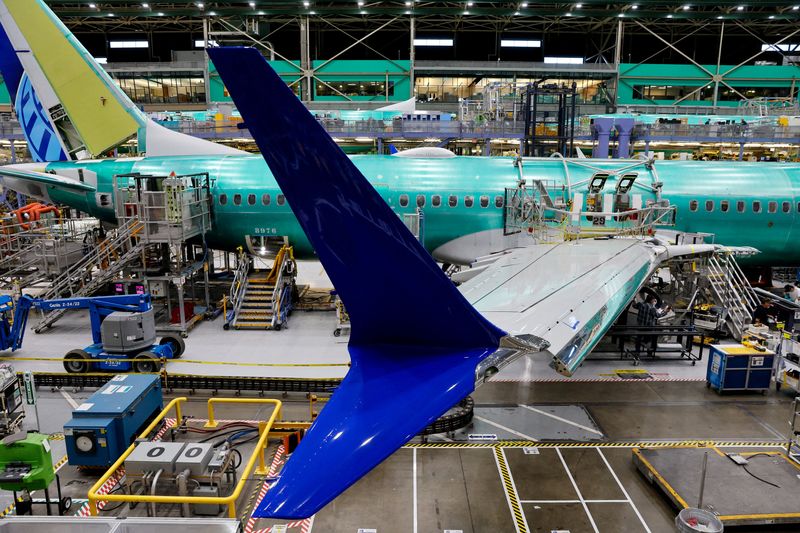By David Shepardson
WASHINGTON (Reuters) -The U.S. National Transportation Safety Board has said more than 40 foreign operators of Boeing (NYSE:BA) 737 airplanes may be using planes with rudder components that could pose safety risks, though it did not identify which airlines could be affected.
The NTSB on Thursday issued urgent safety recommendations about the potential for a jammed rudder control system on some 737 airplanes after a February incident involving a United Airlines flight.
On Monday, the agency said 271 impacted parts may be installed on aircraft in service operated by at least 40 foreign air carriers and 16 may still be installed on U.S.-registered aircraft and up to 75 may have been used in aftermarket installation.
However, the NTSB and the U.S. Federal Aviation Administration did not identify which carriers may be using the parts. Several foreign carriers did not respond to Reuters' queries about their fleet.
Boeing, which declined to comment on Monday, said last week it had informed affected 737 operators of a "potential condition with the rudder rollout guidance actuator" in August, in what is known as a Multi Operator Message.
However, NTSB Chair Jennifer Homendy said in a letter to Federal Aviation Administration Administrator Mike Whitaker that they were concerned "of the possibility that other airlines are unaware of the presence of these actuators on their 737 airplanes."
A spokesperson for Japan's All Nippon Airways, which operates 39 Boeing 737-NG planes, said on Tuesday "as a precaution, we are in the preparatory stages of removing the parts that the NTSB pointed out," adding it had no impact on its operations. It is assessing how many of its planes are impacted, the person said.
Japan Airlines, which operates 62 Boeing 737-800 planes, said none of its 737 planes use the impacted parts, according to a spokesperson, and a China Airlines spokesperson also said it was not affected.
A spokesperson for Ryanair, one of Boeing's biggest customers, also said there was no impact from the component issue.
The NTSB also disclosed on Monday that it had learned two foreign operators suffered similar incidents in 2019 involving rollout guidance actuators.
The issue is the latest setback for Boeing, which has faced a series of safety questions after a mid-air emergency in January involving a new Alaska Airlines 737 MAX 9 missing four key bolts. Shares were down 1.5% in premarket action Tuesday.
The NTSB is investigating an incident in February in which the rudder pedals on a United 737 MAX 8 were "stuck" in the neutral position during a landing at Newark. There were no injuries to the 161 passengers and crew.
The European Union Aviation Safety Agency (EASA) said on Tuesday it was aware of the NTSB report. "EASA is in close contact with the FAA and will take action as needed," a spokesperson said.
Homendy, who spoke to Whitaker about the problem last week, said she was concerned the FAA "did not take this issue more seriously until we issued our urgent safety recommendation report."
The FAA said it was taking the NTSB recommendations seriously and it was scheduled to do additional simulator testing in October.
United said last week the rudder control parts at issue were in use in only nine of its 737 aircraft originally built for other airlines and the components were all removed earlier this year.

The NTSB on Monday criticized Boeing for failing to inform United the 737s it received were equipped with actuators "mechanically connected to the rudder control system" and expressed concerns other airlines were unaware of their presence.
"Flight crews may not know what to expect if the rollout guidance actuator fails at low altitude or during landing," the NTSB said, calling the failure "unacceptable."